

 |
 |
||||
| Home | Reviews | Extras | Forums |
|
Angolmois: Record of Mongol InvasionSynopsisBeing exiled to the island of Tsushima, a group of prisoners are being... politely asked... to help with the defenses of the island from the invasion by Mongolian forces. This is, of course, right up Kuchii Jinzaburo's alley as he used to be a samurai in the service of the Kamakura shogunate. But this is an invasion of massive proportions, and it's clear that Tsushima can't be successfully defended without help from the main region. Will reinforcements make it in time, or are Jinzaburo and friends doomed to fight a battle they have no chance of winning? ReviewI don't have a particularly wide range of shows that deal with samurai culture in general, whether anime or otherwise. The closest and most romanticized of them all -- relatively speaking -- is probably Stan Sakai's Usagi Yojimbo, which I'm not even sure count as a manga on a technical level, but is still probably one of the more accurate representations of said samurai culture and general lifestyle. I said "romanticised", but Usagi Yojimbo still had its fair share of banditry and other, more iffy aspects of the era it was based on. And then, there's Shigurui, another well-researched series that nevertheless served as the polar opposite, a show focusing on a particular sword school that left me cold and detatched when it was all over. Mostly because it was a study in power mismanagement and the pitfalls of valuing ability and notoriety over responsibility and honor. (The latter being a big buzzword among samurai, but also one that could be deliberately misinterpreted into a convenient excuse to apply deadly force on someone.) 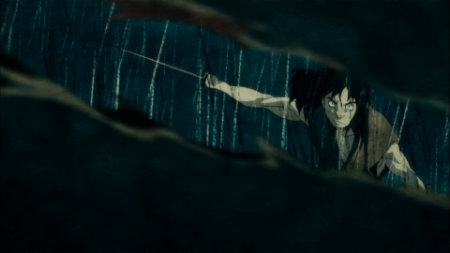 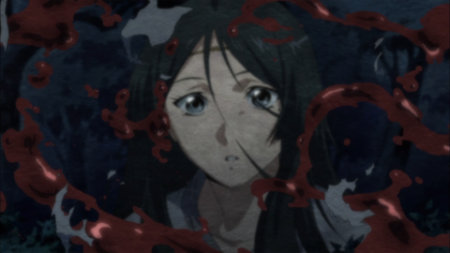 Both of these examples are mostly fictional, though. Angolmois, on the other hand, is more of a loose interpretation of an actual historical event, namely when the Mongols tried invading Japan, which did indeed start with the attack of the Tsushima islands. A few of its characters are based on real-life people, but I think it's safe to say that this particular interpretation is not one to take too seriously as a history lesson, even if it keeps a more balanced view than either of the two aforementioned franchises, although it's also centered squarely around a battle rather than a more diverse presentation of samurai era lives. Not that I think Kuchii Jinzaburo was meant to be an author surrogate or any kind of self-insert fantasy, but he is nevertheless one of the characters that kind of dominate the entire thing. Fair enough, he did serve as a samurai retainer and a student of a particular style of swordsmanship, so his credentials are certainly in order. His actions throughout the show is threading dangerously close to Gary Stu-ship. This is not to say he's the only capable one among the people, but the others still kind of gather around his leadership more often than not. The show balances this out by basically having him being a disillusioned warrior type who was more or less forced into becoming part of the island's defense force. And then we have Princess Teruhi. As the acting head, she's the one who sneakily "enrolls" the refugees in the Tsushima's defense force, much to their chagrin. Due to her own personal history, she's none too fond of warfare in general, though she does at least see the need to put up a defense. Part of the reason why I kinda pegged Jinzaburo as a Stu sort is partially on her feet, in the way she both hates him and also feels subconsciously attracted to him. Like most Princesses, she abhors violence and hates to see her subjects die in needless confrontations, but will still kick some ass if she has to. I'm being a bit flippant, of course, but like a lot of samurai drama (I imagine), no characters are safe from their untimely deaths, and you can probably tell who will eventually go out in a blaze of glory. Which is to say almost everyone if the situation is desperate enough, as is the case in Angolmois. It's not really a big spoiler, as both history and this show is all about how Tsushima took the full brunt of the Mongol invasion before they turned their attention inland. Also, I'm a bit on the fence on whether I think the show's story progression deserves to be called "complex". Historical aspects aside, the characters in the show play their types up a little too much according to expectation. Jinzaburo is the unflappable hero who's never really wrong, and the only reason the show sees fit to have him be taken off guard is because -- as the actual historical event backs up -- this is the first major battle where very rudimentary firearms are being used, as well as explosives. Princess Teruhime being an active battle participant and a woman is not that unlikely, however, since it has been historically proven that women warriors definitely existed even in the past. Japan has its share of historically notable female personalities, and according to history, women played no small parts in mongol warfare, and although the latter isn't showed at all in Angolmois, there are at least enough capable warriors and stalwarth bravery from both genders on the Japanese side. Well, at least as far as I'm willing to lean into the whole warrior culture thing, although in our main characters' case, they don't really have much of a choice in the matter. Even if Jinzaburo seems a little bit too excited about doing his thing. In a weird way, Angolmois kind of feels like what would happen if Gifu Dodo took itself way too seriously and used actual historical events as the main reason to do so. In fairness, Angolmois doesn't really harp on about righteousness all the time, and everyone on the island definitely wished they could've just gone on with their lives without the entire Mongol warrior contingency knocking on every single front door in the vincinity with the intent to burn, rape and pillage. 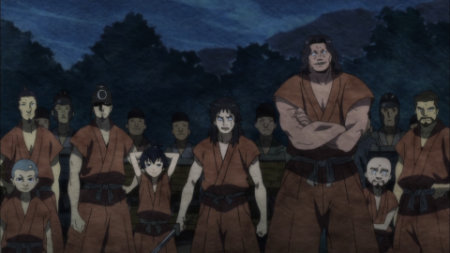 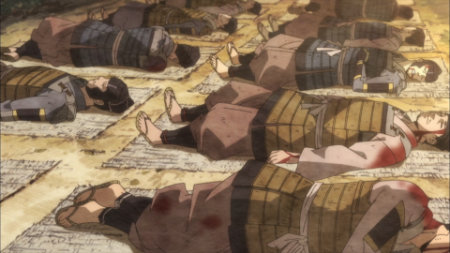 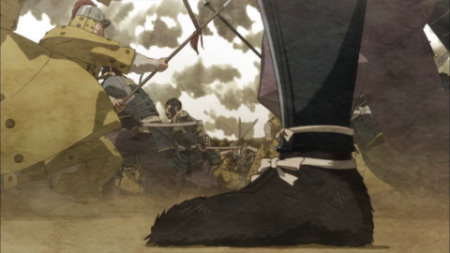 We also get some insight in how the Mongols themselves work, which.... well, they might not necessarily act like moustache-twirling villains who end all their sentences with "MOUHAHAHAHAHAHA", or at least not all the time. One of the Mongol leaders even come across as a bit of a "father to his men", but that courtesy is solely extended to his own people. He takes one look at the Princess and immediately makes plans to have her taken to his room when they capture her, and it doesn't look like he's planning on accepting "no" for an answer. For what it's worth, though, the progress of the battles is the most interesting parts of Angolmois -- it does a pretty good job at presenting how each stage of the war can influence all the players -- like how families split up by circumstances can put someone in a position where they feel they have to betray their own people to save their family, and it's a horrible situation to be in. We also aren't privy to any pre-war dialogue, but that is also more in line with how Tsushima was taken completely off guard by the invasion itself, never mind how the usage of the aforementioned firearms and explosives gave the Mongols a huge advantage. It also helps that the visual style -- cartoonish characters aside -- are very nice. The island of Tsushima looks like a lovely place if this show is anything to go by, and the character designs look more like it's mixing older character aesthetics of more serious works from the 80's and the 90's. That being said, in an attempt to look historical, the show also has this odd visual filter over it that means to give the show some kind of papyrus paper texture look. It would've been fine if not for the fact that said filter is kept in place, so when the show does scenery pans, it just makes it feel like there's something wrong with your eyes. The animation is also all over the place, going from a pretty well animated duel between Jinzaburo and an unnamed assailant in one of the first episodes to downright atrocious single cell-pans and speedline montages later on. Or even changing between the two in a single scene, like when Shark Teeth Man attacks a group of soldiers with his weapon, his swing being very nicely animated, but the soldiers he hits falling backwards like the worst directed amateur stunt extras ever. Basically, the settings and some of the scenery shots look nice, but the fights are more of a dice roll and the visual filter makes it all look kind of cheap anyway. Angolmois seems to want to impart some visual flair to its otherwise very serious story. A lot of the main characters come across as somewhat cartoonish, like Zhang Mingfu. He's a middle-aged man who's apparently a Chinese trader by his own words. He's there solely to make demands he's in no position to make, as well as be the non-lovable coward to the others' bravery. But seriously, he looks like a Chinese Elmer Fudd. We also have Onitakemaru (aka "Shark Teeth Man"), a pirate boss with shark-like teeth who's also a giant of a man. He is only in this to get his revenge on Jinzaburo, and he would never ever ever lay down his life for him or the island or anything, as if someone could actually be a huge tsundere over a place. (I'm not living on this island because I like it or anything. I just don't feel like jumping on the first ship out of here.)  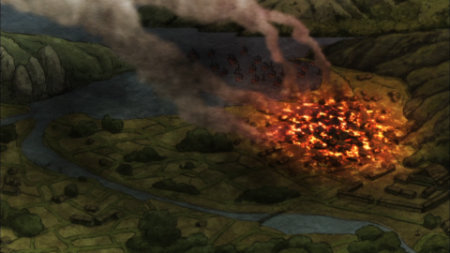 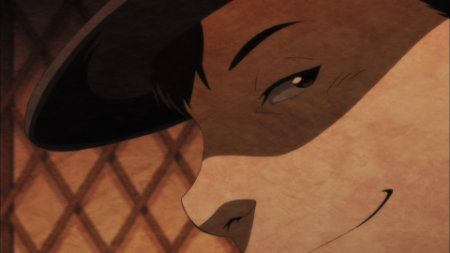 I dunno, man. Angolmois: Record of Mongol Invasion is definitely a serious retelling of an actual war and wants to be taken as such. And to some extent, it succeeds. But between said goofy characters and Jinzaburo's unflappable perfectness in battle that even attracts the one woman who keeps reminding us how much she hates him, I can't completely lean into this. Just having a show where an island is completely overrun with most of its citizens killed would be kind of depressing, though, and lord knows I wouldn't want another Shigurui on my hands. Take whatever levity you can, I guess. Fun to synchro, though. A slightly off-kilter retelling of a real-life invasion, Angolmois will at least not disappoint, assuming you're not a stickler for 100% authenticity. — Stig Høgset Recommended Audience: It's war, so people do of course die by the scores, often onscreen. Heads get chopped off. People get impaled. It bears mentioning that the show isn't trying to be exceedingly violent, though, so don't expect blood and gore all over the place. Also, while it's not shown onscreen, it's heavily implied that the invasion forces are not above raping whichever women strikes their fancy. Version(s) Viewed: Digital stream on Crunchyroll, Japanese with English subs. Review Status: Full (12/12) Angolmois: Record of Mongol Invasion © 2018 Nanahiko Takagi / KADOKAWA / Angolmois Genkou Kassen-ki Production Committee |
 |
|
| © 1996-2015 THEM Anime Reviews. All rights reserved. |